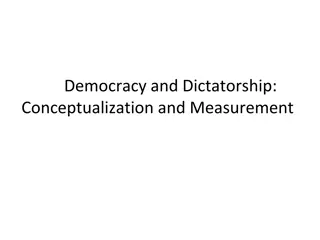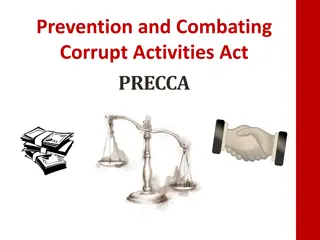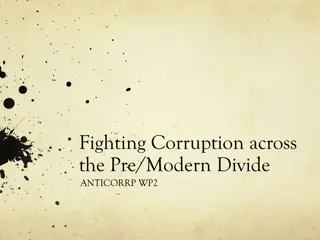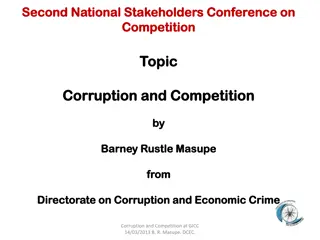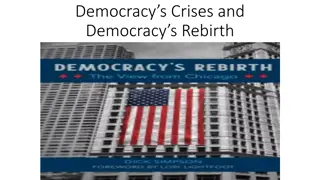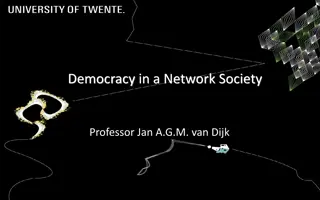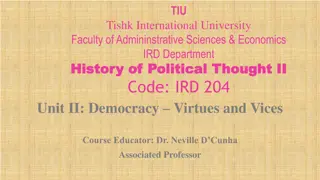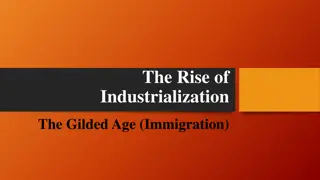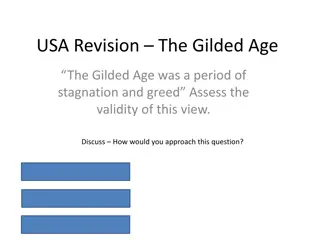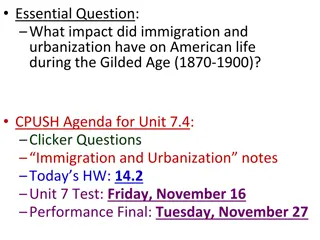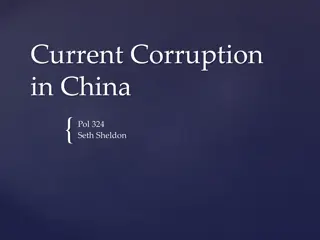Challenges of Democracy and Corruption in the Gilded Age
The Gilded Age (1877-1900) was a time of political inaction and widespread corruption, raising doubts about the endurance of democracy in the face of powerful corporations and wealthy individuals. The era saw a balance of power with partisan divides making lawmaking difficult. Presidents like Rutherford B. Hayes, Benjamin Harrison, and Chester Arthur were viewed as weak, while corruption plagued politics, exemplified by figures like William Boss Tweed. However, figures like Grover Cleveland strove for integrity in a time of rampant political corruption.
Download Presentation

Please find below an Image/Link to download the presentation.
The content on the website is provided AS IS for your information and personal use only. It may not be sold, licensed, or shared on other websites without obtaining consent from the author. Download presentation by click this link. If you encounter any issues during the download, it is possible that the publisher has removed the file from their server.
E N D
Presentation Transcript
The Rise of Industrialization The Gilded Age (Politics)
The Gilded Age The Gilded Age (1877-1900) was characterized by inaction and political corruption Questions began to arise if democracy could survive in a time dominated by powerful corporations and men of great wealth
Balance of Power Party loyalties evenly divided during this time Only twice between 1877 and 1897 did Democrats or Republicans gain control of Presidency and both houses of Congress Situation made it extremely difficult to pass new laws
Balance of Power Presidents of this time period viewed as extremely weak Rutherford B. Hayes owed election to a secret deal Benjamin Harrison became second President to lose popular vote and win electoral college Chester Arthur upset fellow Republicans so much he failed to win their nomination for a second term
Corruption Plagues Politics During this time period, only Grover Cleveland had a reputation for integrity He won the presidency in 1884 (first Democrat in 24 years) Lost presidency to Benjamin Harrison in 1888 despite winning popular vote Elected again as president in 1892
Corruption Plagues Politics Most politicians during this time period extremely corrupt and routinely accepted bribes William Boss Tweed ran Tammany Hall (Democratic political machine of New York) Used political influence to gain money and power through laundering money through the government of New York
Corruption Plagues Politics Thomas Nast, a political cartoonist, drew a number of political cartoons exposing Tweed s illegal activities Led to the arrest of Tweed and his downfall During this era, the spoils system (system where politicians award government jobs to loyal party workers with little regard to qualification) was a central component to politics
The Spoils System Political machines extremely important in national politics Presidential candidates did not campaign for office, because they felt it lowered the reputation of the presidency Parties developed organizations that reached out all over the country to encourage voters All of this organization driven by the spoils system, jobs and promised contracts used to encourage people to vote for their candidate Political participation got a boost from spoils system- 75% to 80% of people who could vote did vote
Civil Service Reform and Honest Government Feeling began to arise that the spoils system made government extremely inefficient, prompted many to push for civil service reforms Civil Service- a system that includes federal jobs in the executive branch Although there were some attempts to change the spoils system, it was feared without it there would be no one to run political campaigns
Civil Service Reform and Honest Government July 2, 1881- President James Garfield shot by Charles Guiteau Guiteau shot Garfield because he felt the Republican party did not fulfill its promise to give him a government job Assassination shined a light on the need for civil service reform and an end to spoils system
Civil Service Reform and Honest Government Though Chester Arthur supported the spoils system, he signed the Pendleton Civil Service Act into law Established the Civil Service Commission Wrote a civil service exam everyone seeking government jobs would have to pass






